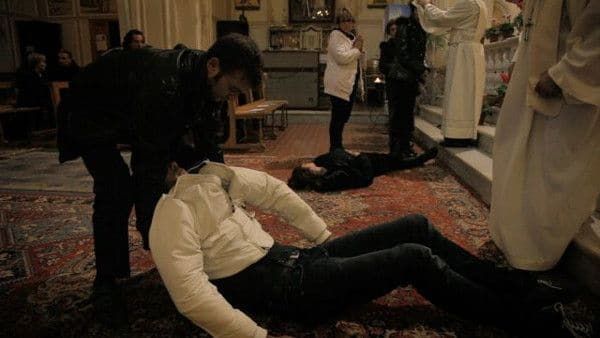Eye For Film >> Movies >> Deliver Us (2016) Film Review
Deliver Us
Reviewed by: Jennie Kermode

There is no official record of the number of exorcisms performed each year around the world, but leading religious figures agree that it's rising. The number of trained exorcists working for the Catholic Church in the US alone has quadrupled in the past decade as more and more people have turned to religion to try and solve their problems. Federica Di Giacomo's documentary takes to an ancient church in Palermo, Sicily, where the faith has been strong for centuries, to observe the work of those offering to heal troubled souls by casting out demons.
Chief among these is the charismatic Father Cataldo Migliazzo, a Franciscan priest whose talents are widely celebrated. He tends not only to those in his local community but to people who have travelled from far and wide to seek his help. Things are so hectic that he has to use a triage system, directing people to other solutions where possible (it's notable that this sometimes includes psychiatric services), attending to only the most serious cases himself. He also holds group ceremonies which seem designed to be more like blessings but nevertheless result in some attendees writhing on the floor. One individual, apparently in urgent need, receives an exorcism via mobile phone.

These intrusions by the modern world into a decidedly Medieval setting suggest a Church that is, in its own way, moving with the times. Change is acknowledged and absorbed in the way it is by some Amish communities - after careful processing, only when it is clearly useful, and without changing the underlying cultural ethos. Sometimes a religious approach is denied - parents are told that they should pay more attention to their child, a young woman is advised that she seems to be suffering from depression. In other cases, there are clear symptoms that would be identified elsewhere as indicative of schizophrenia, but they are interpreted as the behaviour of an inhabiting demon. One woman's relatives suggest that this is a recurring problem for her but that an exorcism every few years seems to put her at ease.
Di Giacomo's approach is patient, restrained; the viewer is not urged to come to any particular conclusion. Should these people be receiving proper psychiatric care instead? Perhaps. Is it available? That's less certain; in most places, such resources are low in proportion to need. A more difficult question is to what extent the Church and the ways of thinking that it teaches may be responsible for driving some of these people to desperation in the first place. Migliazzo tells several mothers (and occasional fathers) than their relative lack of devotion is the reason why their children have become vulnerable to evil forces. The film screened at Fantasia, a reminder that many people are most familiar with exorcism through the horror film, but the nature of the horror here very much depends on one's perspective.
Also intriguing here is the breakdown of class. People from all backgrounds come to abase themselves before the priests. The priests understand their own status in a strict hierarchical tradition, and we get the sense that they live by this wholeheartedly, not just following the letter of the law. This is patriarchy at its most formal.
The film is too long and would work better with some repetitive scenes cut out, but much of it is fascinating. Di Giacomo treats us to some beautifully framed shots which provide a sense of the awe such environments must evoke in believers, but then gets in close, almost tabloid style, to capture the pleas of impassioned supplicants. This parallel between the majestic and the intimate helps to illustrate the power dynamic at work.
When finally we cut away, moving beyond Palermo, it is to a Vatican conference where the urgency of training more exorcists is under discussion. Is this a sign of the End Times? Is it the last gasp of a primitive institution seeking to assert itself in an increasingly secular world? However one reads it, there is a sense of urgency here that mirrors that in many recent documentaries about politics. The social order is in flux; nobody really knows what's coming next, and people are troubled. Those bodies writhing in the aisles represent a wider cultural malaise. The urge to find salvation is a sympathetic one; the question is, from what?
Reviewed on: 02 Aug 2017

















